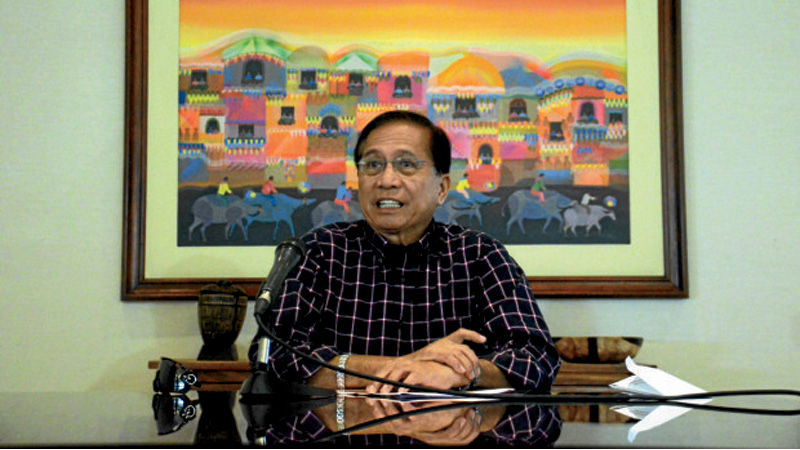
Presidential Adviser on the Peace Process Jesus Dureza hold a press conference after his arrival at the Ninoy Aquino International Airpor in Pasay City. ARNOLD ALMACEN/INQUIRER
THE PHILIPPINE government and communist leaders plan to hammer out guidelines for a bilateral ceasefire within 60 days, Presidential Adviser on the Peace Process Jesus Dureza said on Monday.
The cessation of hostilities is to be enforced through mechanisms that would monitor violations and enable joint cooperation, as the indefinite ceasefire declarations by the government and the National Democratic Front of the Philippines (NDFP), the political arm of the Communist Party of the Philippines (CPP), remain separate unilateral gestures for now.
“It is important to have mechanisms so there would be ways to prevent possible clashes—who will intervene and for what reasons,” Dureza told reporters in a briefing on arrival in the country at the end of the first round of talks in Oslo, Norway.
He said it might be possible for the government to adopt a template similar to its ceasefire with the Moro Islamic Liberation Front, but added that the NDFP might have other proposals in mind.
The government and the NDFP will return to Oslo for the second round of talks on Oct. 8-12.
President Duterte said on Monday the ceasefire should not prevent soldiers from patrolling around the country.
The President reminded the Armed Forces of the Philippines to comply with the ceasefire agreement that the government and the NDFP signed during the first round of talks in Oslo.
“But I do not believe in the theory that just because there is a ceasefire, there is an area where the soldiers or the policemen cannot enter,” Mr. Duterte said during his visit to the wake of a policeman in Catbalogan, Samar.
The President said government forces and the communist rebels should stop killing each other.
For now, Dureza said: “We cannot discount [the possibility of shooting incidents], but the idea is that both sides are committed. Don’t expect this to be a walk in the park. There are still plenty of issues.”
While the peace panels came up with an “indicative timeline” to finish an agreement within one year, Dureza stressed the importance of taking things one step at a time.
“While we’d like to see an early end, please also manage expectations. The road map is not always rosy,” he said.
He described the basic advocacies of the NDFP as “malalim at matindi (deep and serious),” as he acknowledged the need for socioeconomic structural reforms. With a report from Marlon Ramos